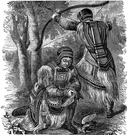E·ven·ki
(ĭ-wĕng′kē, ĭ-vĕng′-) also E·wen·ki (ĭ-wĕng′kē)n. pl. Evenki or E·ven·kis also Ewenki or E·wen·kis
1. A member of a people inhabiting a large area of eastern Siberia in Russia and northern Nei Monggol (Inner Mongolia) in China.
2. The Tungusic language of the Evenki. In both senses also called Tungus.
[Russian, Evenki people, from Evenki ə´wənkī.]
American Heritage® Dictionary of the English Language, Fifth Edition. Copyright © 2016 by Houghton Mifflin Harcourt Publishing Company. Published by Houghton Mifflin Harcourt Publishing Company. All rights reserved.
Evenki
(əˈvɛŋkɪ)npl Evenki
1. (Peoples) a Tungus people of E Siberia
2. (Languages) the language of this people
Collins English Dictionary – Complete and Unabridged, 12th Edition 2014 © HarperCollins Publishers 1991, 1994, 1998, 2000, 2003, 2006, 2007, 2009, 2011, 2014
E•ven•ki
(ɪˈwɛŋ ki, ɪˈvɛŋ-)n., pl. -kis, (esp. collectively) -ki for 1.
1. a member of a people of central and SE Siberia and adjacent parts of Mongolia and NE China.
2. the Tungusic language of the Evenki.
Random House Kernerman Webster's College Dictionary, © 2010 K Dictionaries Ltd. Copyright 2005, 1997, 1991 by Random House, Inc. All rights reserved.
ThesaurusAntonymsRelated WordsSynonymsLegend:
| Noun | 1. | Evenki - a member of the people inhabiting an area of northern Mongolia and eastern Siberia |
| 2. |  Evenki - the Tungusic language of the Evenki in eastern Siberia Evenki - the Tungusic language of the Evenki in eastern SiberiaTungusic language, Tungusic - a family of Altaic languages spoken in Mongolia and neighboring areas |
Based on WordNet 3.0, Farlex clipart collection. © 2003-2012 Princeton University, Farlex Inc.